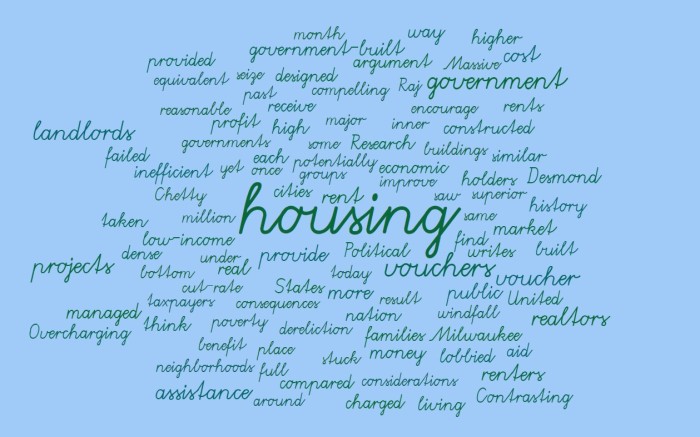Housing vouchers have been a major political win for landlords and realtors. Matthew Desmond’s book Evicted is about the real negative consequences of America’s high cost of housing, and he addresses housing vouchers which have been one of the main forms of public assistance for low-income renters. Our country likes market, or near-market, mechanisms to provide aid and assistance. Housing vouchers represent that preferred market mechanism, especially when compared to government provided, low cost housing. However, housing vouchers are not necessarily the most efficient way to provide assistance to those who cannot afford a place to live.
Desmond writes, “In Milwaukee, renters with housing vouchers were charged an average of $55 more each month, compared to unassisted renters who lived in similar apartments in similar neighborhoods. Overcharging voucher holders cost taxpayers an additional $3.6 million each year in Milwaukee alone – the equivalent of supplying 588 more needy families with housing assistance.”
Housing vouchers are taken advantage of and abused by landlords and the companies managing apartment complexes. If an individual with a voucher is not facing the full cost of the housing unit, then they don’t have the same market pressures to find alternative housing options. The result is that higher rent can be charged, with that higher rent absorbed by the voucher. Money and aid is ultimately wasted, and families who could receive help do not receive it.
The extra money that can be made by overcharging voucher holders is a windfall for landlords and realtors, and unsurprisingly, both groups lobbied for voucher systems rather than government provided housing. Desmond writes, “Landlords and realtors saw government-built and -managed buildings offered at cut-rate rents as a direct threat to their legitimacy and bottom line.” If the government could provide housing at reasonable rates, then renters wouldn’t have to put up with high rent and lousy living conditions in slums. Contrasting a voucher program that encourage rent seeking behavior, those who profit from vouchers would lose money under a system bolstered by public housing and would have to lower rents or improve property to compete against government housing that didn’t have a profit motive.
It is easy to say that government-built and -managed housing has failed in the United States and that vouchers are clearly the superior way to provide housing assistance, even if they are inefficient. But I don’t think that is a truly valid argument, and I don’t think Desmond would find it a compelling argument either. Massive housing projects in the United States were built in a way that clustered poverty, creating dense units of low-income individuals. Research from Raj Chetty has shown that economic integration and mixing is important for social and economic success, and the experience of those living in dense housing projects supports Chetty’s research. Housing projects were also constructed at a time when cities and local governments were disinvesting in inner cities, before lead abatement programs had taken hold, and when the nation had not yet begun to reckon with its racist past. In some ways it seems as if these approaches to government housing projects were intentionally designed to fail.
I don’t see any reason why government-built and -managed housing could not be successful today if built in a more dispersed manner, if designed to integrate poor, and constructed to be responsive to the racists history of housing, drug, and incarceration policy of our nation. Of course this would require real investment from the government, contrasting the disinvestment that mass housing projects once witnessed. Political considerations are the real barrier, as realtors and landlords would surely seize upon the history of failed housing projects, and stoke fear of crime and dereliction that many American’s likely harbor around public housing. Unfortunately, our unwillingness to imagine a new form of government housing means that we are stuck with inefficient housing vouchers, lobbied by (and potentially doing more to benefit) landlords and realtors than the people who are the intended recipients.
